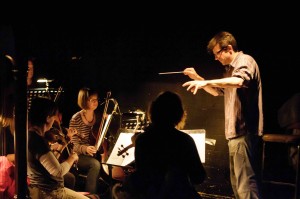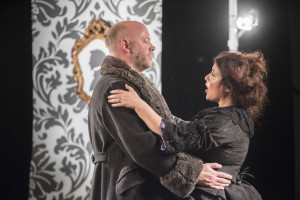Over the last few decades the emergence and expansion of small to mid-scale opera performances across the globe has been phenomenal.
Audiences are the key, from city suburbs to country barns, people of all backgrounds have flocked to see not only singers at close range but also musicians delivering solo lines, with concentration imbued on their faces, something that audiences at big opera houses rarely experience.
‘Reduced orchestrations’ have grown in number, executed by a quiet consortium of arrangers (of which I have been one for some 25 years). Between 10 and 12 players is the magic number – five string players, five wind players and, perhaps, harp and percussion. For my part, the challenge has been to create the illusion to the audience that the composer either wrote the arrangement him/herself or that no arrangement has in fact been undertaken. If an audience member attends a performance that uses my reduced orchestration, and notices nothing untoward, I consider that a success!
Jonathan Lyness, Music Director Mid Wales Opera
Mid Wales Opera’s latest tour takes our mission to take opera to new audiences to a whole new level. The concept was to take a one-act opera (always a tricky customer, difficult to program and to sell) from the twentieth century repertoire (even more difficult to sell with potential complications concerning copyright), reduce its size to something that could fit into the back of an estate car (this was beginning to sound preposterous!), make sure equal attention was paid to numbers of musicians as well as singers (inevitably requiring an arrangement of the score) and take it all over Wales to outlying and/or deprived communities where opera is rarely, if ever, performed.
We wanted to deliver a financially and artistically viable solution to the challenge of opening up opera to audiences, young and old. MWO’s first foray into this way of doing things takes place this autumn, with a fifteen-performance Welsh tour of William Walton’s classic comedy The Bear.
The piece is scored for a small chamber orchestra and my target was to arrange the score for about five musicians, to accompany a cast of three singers. My approach was not ‘which instruments can I take away’; instead, I thought ‘which instruments most characterise the piece – how does Walton create instrumental sentiment and character to enhance the work’s impact and comedy.’ The first instrument that sprang from the full score was, unexpectedly, the bassoon. The widow Madam Popova is in mourning and Walton plays on this using a gently falling bassoon melody.
The piano, harp and percussion are integral to Walton’s sound world and so, together with bassoon and, on final reflection, a violin (doubling viola), I had my five-piece grouping. With no conductor, this is chamber opera in its truest guise, and MWO’s forthcoming Autumn 2017 tour, whilst forfeiting previous plans of putting an opera into the back of an estate car, will, it is hoped, be the beginning of a whole new way of audience building across rural Wales.
William Walton’s The Bear
Experience opera like never before with the MWO SmallStages team in a brand new version of this hilarious one-act comedy classic.
Based on Anton Chekhov’s play, The Bear tells the tale of the widow, Mme Popova, interrupted from her constant mourning by the arrival of the rough-hewn debt collector Smirnov (the “bear” of the title). Passions run high and their sparring culminates in a duel – and an unexpected romance.
Full of entertainment, comedy, parody and great tunes, this intimate new production of The Bear, featuring three singers and five musicians, is a brilliant introduction for audiences new to opera and a great opportunity for all music lovers to hear Walton’s classic comedy in its fiftieth anniversary year.
For full details of MWO’s SmallStages 2017 tour of William Walton’s The Bear, go to www.midwalesopera.co.uk
The tour
November 2nd Llandinam Village Hall, Powys
November 3rd Llanfair Caereinion Institute, Powys
November 4th Abermule Community Centre , Powys
November 6th St Hywyn’s Church, Aberdaron, Gwynedd
November 7th Criccieth Memorial Hall, Gwynedd
November 8th Theatr Twm O’r Nant, Denbigh
November 10th Neuaddydderwen, Rhosygilwen, Cilgerran
November 11th The Coliseum, Ceredigion Museum, Aberystwyth
November 16th The Welfare/Neuadd Les, Ystradgynlais
November 17th Dragon Theatre/Theatr y Ddraig, Barmouth
November 18th Neuadd Dyfi, Aberdovey, Gwynedd
November 23rd St Mary’s Church, Hay-on-Wye, Powys (Hay Winter Festival)
November 29th Ludlow Assembly Rooms, Ludlow
November 30th Ammanford Miners’ Theatre
December 1st Congress Theatre, Cwmbran
December 3rd Presteigne Assembly Rooms, Powys


